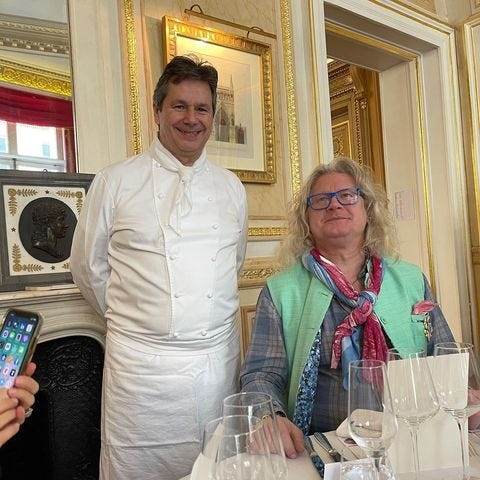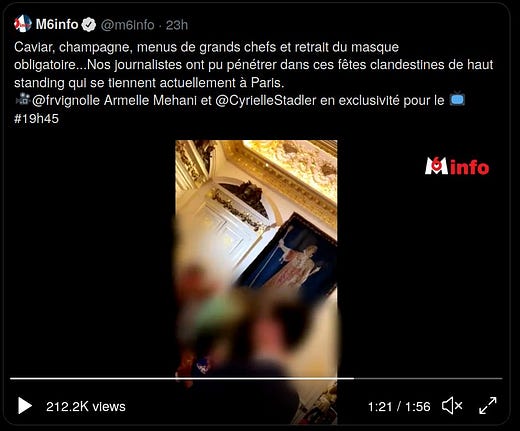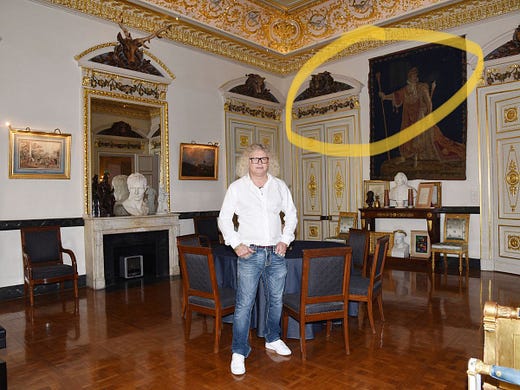Once Upon A Time In France: Clandestine Cuisine, Cinematic Glut, And A Clown's Tale
Dreaming Of Rocamadour
A nation like France needs a good class-driven scandal from time to time to distract it from the daily pandemic woes. Last weekend, it got the perfect controversy thanks to an undercover story about secret restaurants and parties being organized for some of the Paris elite.
The uproar began Friday night on TV station M6 during a news show unimaginatively called le1945 (broadcast at 19h45). A pair of enterprising reporters conducted a hidden camera investigation visiting some of these “clandestine” restaurants and parties, interviewing guests and organizers.
In one clip, they enter a nondescript building in a ritzy Paris neighborhood. There’s no indication from the outside that there’s a restaurant of any kind inside. When the reporters find the right door, the host asks who sent them (it seems a reference is key) and then explains the menu for the evening ranges from €160 to €490 per person.
As this tweet explains: “Caviar, champagne, menus from top chefs and compulsory mask removal ... Our journalists were able to enter these high standing clandestine parties which are currently being held in Paris.”
Other important rules include no masks allowed. “Once you pass through the door, there’s no more Covid,” the host explains. “We want people to feel at ease here. It’s a private club and we want people to feel at home.”
Using the word clandestine captured the illegal spirit in just the right way to maximize the insidious nature of it all. The word harkened back to an era of collaborators and underground economies and illicit benefits. If the nation is at war with Covid, as President Emmanuel Macron proclaimed last year, a Black Market of some kind was inevitable.
On its own, this tasty scandal had all the perfect elements to ignite a French firestorm of modern-day indignity. Just as the nation headed into its 3rd national lockdown, the idea of an elite class cavorting at secret dinners violated every tenant of egalitarianism that is such a part of the French DNA.
Even better (or worse, depending on your perspective) is that it involves the intersection of food and social life. Everyone has felt the loss of this over the past year, but this is such a fundamental part of the French soul that the absence of communal culinary evenings feels particularly profound here.
But the cerise on this scandal gâteau was the suggestion that several government ministers may have been part of this underground party circuit. The “art collector” interviewed in the tweeted excerpt above notes that he had eaten in the past week at 2 or 3 dinners with “a certain number of ministers.”
As #RestaurantsClandestins began to trend on Twitter, it was soon joined by #OnVeutLesNoms (we want the names!), a call for people to come forward and denounce their fellow party animals, particularly should they be government officials.
Suddenly, a culinary and health transgression had become a political affair.
On TV, Marlene Schiappa, a deputy minister of the interior, declared that any government official who attended such underground parties and broke the rules should be charged and fined — just like anyone else.
Her boss, Interior Minister Gérald Darmanin, tweeted that he had called for an investigation into the dinners. "Following the M6 report, I asked the Paris police prefect to verify the accuracy of the reported facts in order, if they are verified, to prosecute the organizers and participants of these clandestine dinners," he wrote.
By Sunday, Paris prosecutor, Rémy Heitz had opened an investigation into these parties. He promised to confirm whether such parties were organized, and by whom, and whether health rules were broken.
Meanwhile, it appeared at least some of the organizers had been publicly identified. They included Christophe Leroy, the “chef to the stars” whose Instagram account is filled with photos of recent swanky meals he’s organized. As for the “art collector” who organized the party captured by M6, many pointed the finger at Pierre-Jean Chalençon (below right) in this photo with Leroy.
Chalençon denied this on Twitter, but several digital detectives noted that the restaurant in one of the M6 clips seemed to be unmistakably his place.
So far, no torches and pitchforks have been spotted in the streets of Paris. But the elite probably shouldn’t get too comfortable. By Monday morning, #MangeonsLesRiches (Let’s eat the rich!) was trending on Twitter.
A Cinematic Traffic Jam
Every silver lining must have a cloud. With vaccination rates rising, and the French government targeting the middle of May as a time when restaurants and movie theaters might (might!) reopen, people are starting to fantasize about seeing films on the big screen again. But this has given rise to a new concern among French cinéastes: A glut of unreleased films.
According to Le Monde, distributors in France are currently sitting on some number of films ranging from 400 to 420, including domestic and international titles. The first fear is that there are simply too many films to be released all at once. If that were to happen, each film would be shown on too few screens to make any money.
Speaking to Le Monde, Hélène Herschel, general delegate of the National Federation of Film Publishers (FNEF), used the French word bouchon which is the cork in a wine bottle but also slang for a traffic jam. Naturally, she evoked two films involving traffic jams, (Huit et demi, by Federico Fellini, and Le Grand Embouteillage, by Luigi Comencini) to make her point.
The second fear is that amid this cinematic scrum, big American blockbusters will crush all independent films. “We fear a massacre,” said Jean Labadie of the distributor Le Pacte.
The film industry has called on the nation’s competition authority to sort out this mess and develop a “concerted schedule” of releases. To ease the financial crunch, the National Center of Cinematography and the moving image (CNC) announced it would bend its rules to allow films to be released to streaming platforms one month after being shown in theaters. Typically, such films have to wait at least one year. In this case, they will still be able to benefit from government aid programs which are usually reduced for online productions.
A Clown’s Tale
Perhaps this wasn’t a big breaking news story, but I was deeply moved by this Le Monde story bout Olivier Guitel.
Since moving to France, I’ve been following the increasingly tragic fate of small family farmers. It’s not so different than the problems facing rural farmers in the U.S.: The impact of globalization, lower subsidies, growing buying power by big supermarket chains, and a cruel financing system that imposes big debt. Our local paper regularly carries stories of the growing suicide rate among farmers, or the extraordinary efforts to raise money from family and friends to keep things going.
If you can find it, watch Au Nom De La Terre (In The Name Of The Land), a film by Édouard Bergeon that recounts his own father’s farming struggles. It’s massively depressing but inescapably powerful.
Guitel faced many of these same issues. Despite his lack of interest, he was essentially forced to take over his family farm, and in doing so assumed the debt that came with it. As with Bergeon’s father, that financing is particularly brutal because it is in part secured and paid to Guitel’s father.
Meanwhile, Guitel’s real passion was the circus and the theater. As his relationship with his father deteriorated, and his anger grew, he sought to find ways to organize theater troupes in the offseason. But it was after enrolling in a clown course in 2004 that he seemed to finally find himself. That includes embracing his homosexuality and peacefully separating from his wife. With a neighbor, he founded the Etincelle Bouillasse clown company which led to the creation of his signature clown personality: Raoul Nitrate, the agriclownteur.
Several years ago, he struck a deal with a local cooperative to take over management of the farm, though he still spends about 10% of his time dealing with agricultural-related matters.
The rest of his time is dedicated to clowning, making Guitel one of the rare ones to escape the farming trap and find a way to be happy and fulfilled. He performs at his own makeshift theater, as well as schools and hospitals. He’s not getting rich, but he’s getting by. And he’s learning to be happy by following Raoul Nitrate’s motto: “sow disorder to collect laughter.”
Dreaming Of France

Rocamadour is located in the Dordogne Valley, one of the most spectacular corners of the Lot Department in the Occitanie region. The town appears to be carved directly out of the limestone cliffs, creating a vertiginous sensation.
Almost one thousand years ago, the site became popular for religious pilgrims for reasons today that remain a bit hazy. But along the way, a spectacular sanctuary was constructed. That includes a castle on top of the cliffs which is reached by a set of stone stairs, and several cathedrals below, including a Notre Dame that contains a Black Madonna. Further down is the village which offers some wonderful local food options and chances to explore Rocamadour’s history.
For a different look, visit Rocamadour in September when it hosts an annual Hot Air Balloon Festival. The French invented the montgolfier and it remains a great source of pride. But in this case, the setting of colorful balloons hanging above the valley with this town as a backdrop makes for a stirring combination.
Great Reads
As France heads into its 3rd lockdown, the performance of President Emmanuel Macron continues to be divisive. Politico took a long look at how his handlers are trying to shape the debate around his policies and the results:
“With the next presidential election just over a year away, Macron’s aides and advisers have been playing off both music sheets, trying to convince French voters that their president is the most capable option for shepherding them through the crisis — but is simultaneously not to blame for any of the failings taking place along the way.”
The Economist examined changes to the French military that suggest a more aggressive posture. Anne Swardson shared her growing appreciation for the bouquinistes of Paris, the booksellers who line the Seine. Their businesses, always precarious, have been devastated by the loss of tourism. But their passion compels them to persist:
“It was clear from talking to the proprietors how much they enjoyed their work. One of them said he could have survived on the rental income from a little studio apartment he owned, but he wanted to be at his stall near the Pont Neuf because he liked meeting and talking to people. Another had had various jobs over 30 years, including in industrial design, but said this was the first profession he’d really enjoyed.”
And finally, The New York Times recounts the rise and financial fall of Lille’s soccer team. I’m not a football obsessive, and so don’t follow the season closely. But this tale goes into the economics of the sport, and in this case how the pandemic sunk the fortunes of this club even as the team competes for first place:
“Gérard López, Lille’s former owner, used to boast that if his team was not “the best in the world in trading players, we’re probably in the top three, four or five.” This season should have been his proof.
But if anything — and through no fault of their own — the market value of Lille’s players has not only fallen this season, but it has also dropped to such an extent that, in December, López had no choice but to cede control of the club.”
Chris O’Brien
Toulouse, France









